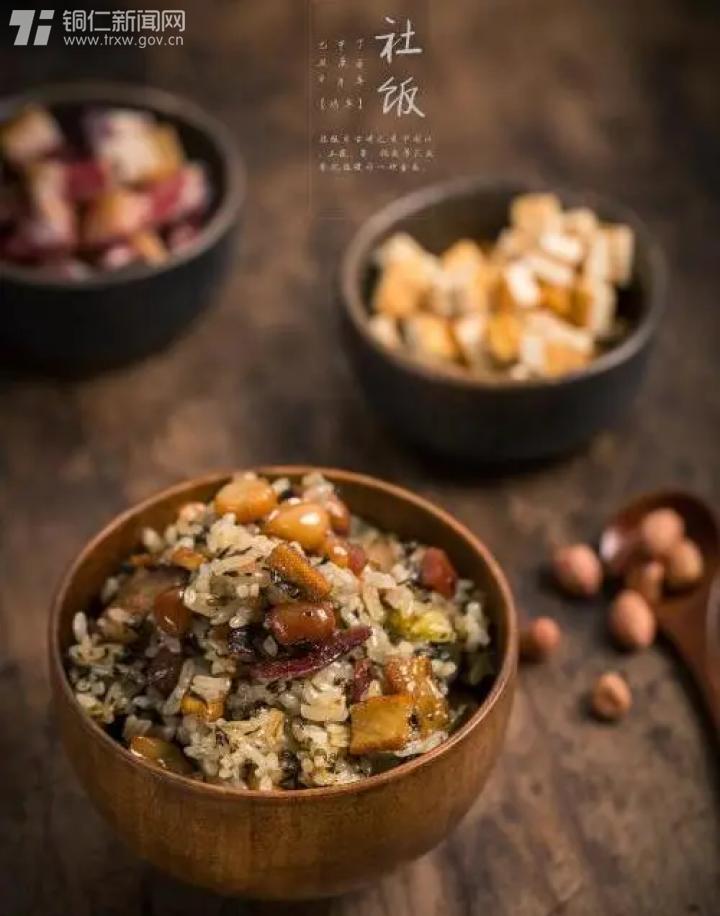The fifth day after the establishment of spring is the traditional Chinese spring day.
The people of Tongren have ushered in a festival with a long history - passing the society. Whenever this time comes, my grandmother's kind and gentle voice rings in my ears: it is time to make community meals again, and it is time to go up the mountain to "hang up the society".

When I was a child, I didn't know what "passing the society" was, only that on a certain day in March every year, my grandmother would carry a small basket of rattan weaving, hold my hand through the winding mountain road, and bend over to take me to look for artemisia.
Later, when I went to school and read, I learned that the word society was taken apart, "soil" was land, and "show" represented sacrifice, representing a demonstration of some kind of ritual. "She" in ancient times referred to the god of land, and the sacrifice of the god of land was an important ritual in traditional Chinese farming society.
In ancient times, the society was divided into the Spring Society and the Autumn Society. "The plan of the year lies in the spring", and the artemisia that makes the company rice is also ripe in the spring, so most of the people who have passed the society refer to the spring society, and the autumn society is little known.
According to the "Tongren Guangxu Fu Zhi", "a few days before and after the Qingming Dynasty in March, the white paper is hung on the ancestral tomb, which is called hanging green; if the service is not served, the tomb is swept before the sheri day, and the wild vegetables and rice are used to worship it, which is called the society meal."
In the first 3 years after the death of the elder, before the Qingming Dynasty, he will go to the grave to make a sacrifice, called the "hanging society". Steam the community meal, bring wine and meat, invite relatives and friends, go to the graves of relatives to sound firecrackers, burn paper money for sacrifice, and then sit on the ground, drink and eat community meals, called "hanging society". According to research, the custom of Tongren people to visit graves and eat social meals on sheri day has continued for more than a hundred years.
Every year in the spring, everything is revived and full of vitality, and the fresh and vigorous artemisia and wild onions are all over the mountains, and Grandma said that this is a good time to make community meals.
The production process of social rice is quite exquisite. First of all, the main ingredients of glutinous rice must be soaked for three or five hours, until the rice grains have absorbed enough water, filtered with a basket, cut into small finger-sized particles with the best bacon and dried beans, and then mix the processed artemisia and wild onions with the glutinous rice. Then, it is steamed in a koshiki and served with a full koi with the fragrance of artemisia.
When I was a child, I watched my grandmother cook social meals, and I only felt that she could do everything, go to the mountains to pick artemisia vegetables, come back to wash, rub, and one complicated production process after another, in front of the skillful grandmother, it seemed to become a piece of cake. She always smiled and said that now that life is good, social rice has become a snack that can be eaten at any time, and eating social rice has become a kind of fun, it is a life spice, and it has the meaning of remembering bitterness and sweetness. Unlike their time, rice is a luxury, every year except for the New Year, looking forward to the arrival of the Spring Society Day, a family of several children, each with a small bowl of community rice can be happy for half a day.
Now grandma has also left, living in the city without the atmosphere of every household making social meals and exchanging social meals, I have lost this skill, I can only buy ready-made social meals on the market to eat, there is no happiness made by hand, the taste in the memory is no longer there, but Grandma's voice and smile seem to be still yesterday: it is time to make social meals to eat, and it is time to go up the mountain to "hang the society". (Reporter Xu Rui)